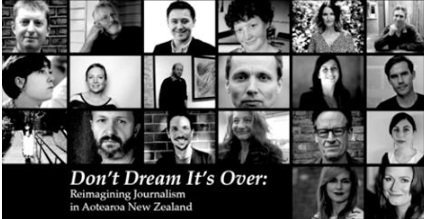by Peter Griffin
With the proposed mega mergers between both NZME and Fairfax New Zealand and Sky TV and Vodafone New Zealand currently before the Commerce Commission, it is only too clear that the mainstream media could look a bit different this time next year.
In addition to that we have insights into the extent tech giants Facebook and Google are claiming the online ad revenue that media outlets are depending on for their future sustainability and new media players like the Spinoff.co.nz are gaining a toe hold with new business models that are less dependent on display advertising.
As such, it really is a good time for discussion about the future of the media society needs and wants.
The Science Media Centre is engaging in that discussion. Last year, we co-hosted the third and final of three workshops as part of the Civics and Media Project, which set out to answer the question:
How do we ensure we have a well-informed and civically engaged population in 2030?
Our three workshops held in Auckland and Wellington looked at the current state of play in media, education and the civics space, what needs to change and how it could change. Over 200 people contributed directly to the workshops which I found hugely engaging and thought-provoking.
All of the context, discussion and ideas have been condensed into this summary of proceedings which ends with some really interesting and promising potential action points. A lot of work is needed to give the best of these ideas some critical mass and now is the time to be considering exactly how we do that.
Workshop 3 of the series was held in November at the Royal Society of New Zealand and the excellent presentations were recorded. This one in particular, featuring University of Auckland microbiologist Dr Siouxsie Wiles arguing for science literacy and boosting the critical thinking skills of children, was powerful and passionate.
Some of the leaders of those workshops have collaborated on a series of articles that have been published in the latest edition of Policy Quarterly and which are available to read online here.
 At the same time, the publisher Free Range Press is gearing up to publish Don’t Dream It’s Over: Reimagining Journalism, a book featuring commentary on the state of New Zealand journalism and its future direction from some of the country’s leading journalists and writers. The SMC is proud to support publication of the book, which is the subject of a crowd-funding campaign to get the final publication costs covered.
At the same time, the publisher Free Range Press is gearing up to publish Don’t Dream It’s Over: Reimagining Journalism, a book featuring commentary on the state of New Zealand journalism and its future direction from some of the country’s leading journalists and writers. The SMC is proud to support publication of the book, which is the subject of a crowd-funding campaign to get the final publication costs covered.
A week away from the SMC’s eight birthday, we have been reflecting on how much the media has changed in the time we have been going. The move to digital-first publishing and away from specialist coverage has really changed the face of how science is covered in New Zealand we are changing how we work to accommodate it. Science-related issues are more prominent in our lives than ever before and it is really important that people feel well-equipped to engage with these issues and that the media is in a position to provide independent and quality coverage of them.
With major structural change looming, now is the time to broaden the discussion about the future shape of the media and the role it should play in fostering a civically-engaged society.
Peter Griffin is the director of the Science Media Centre.